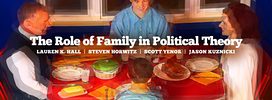I love the way that Jason poses the question, because it shows the stakes in the debate. It is not merely that families are about well-being as we understand it now, and all attempts to defend family life purely on those terms have something missing. Lauren’s response—that the family is an end in itself and experienced as such—is good so far as it goes. I think that more needs to be said in this respect, so let me restate Jason’s challenge and talk a bit about how political philosophy deals with it.
Perhaps I have more faith in technology than the others in this regard, but I do think that we may, in the medium term, replace the family and find other things that perform its functions in the future. Perhaps cloning instead of procreation. Perhaps day cares instead of families—it would be a matter for state institutions since families would not be involved in producing children. Perhaps the universal desires that Lauren sees are less universal than she thinks, and people do not have a desire to propagate as opposed to copulate (some evidence tends in this direction, I would suggest, as we see the world wide decline in birth rates well below replacement rates in almost every country in the advanced world). Perhaps, perhaps, perhaps.
But what sits at the other side of this divide will not be human beings. Perhaps, as Steve may think, they will be “more than human” and the advances in freedom will lead to an open-ended progress—or is his confession that he wears rose-colored glasses a confession that he is fibbing a little, and that he sees a tragic element in all of this? I tend to think that it would be a tragedy if we lived in a post-familial future and that the leaky, weather-beaten vessel of our humanity reflects the truth of our mixed condition. I think that I have Huxley’s Brave New World in my corner. John the Savage—a human being in the old sense of the term in that book—defends the idea that our condition is filled with ups and downs, and costs, and that it has its strange beauty too. The hope for a costless future is the hope for a post-human future.
In the long-term, in other words, I think the future of humanity is at stake in how we think about the family. It is the job of political theory or political philosophy to consider what our condition is and how our regime affects our nature.
Perhaps some think that political philosophy is a venue for coming up with legal rules or distinctions. It certainly involves such things. Yet it must go beyond them to reflect on our nature and how it is shaped by our regime. I think that the ultimate question dividing our conversation concerns the nature of human being. Regimes emphasize some elements of our nature at the expense of others, and it is the job of a statesman, informed by political philosophy, to call attention to the elements of human nature that a regime neglects and to defend those elements in an effort to bring balance to the regime. Regimes are partisan or partial, and political philosophy aims at the whole.

